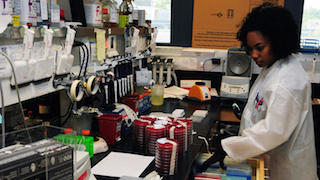Colistin
See the following -
A 'Slow Catastrophe' Unfolds as the Golden Age of Antibiotics Comes to an End
 In early April, experts at a military lab outside Washington intensified their search for evidence that a dangerous new biological threat had penetrated the nation’s borders. They didn’t have to hunt long before they found it. On May 18, a team working at the Walter Reed Army Institute of Research here had its first look at a sample of the bacterium Escherichia coli, taken from a 49-year-old woman in Pennsylvania. She had a urinary tract infection with a disconcerting knack for surviving the assaults of antibiotic medications. Her sample was one of six from across the country delivered to the lab of microbiologist Patrick McGann...
In early April, experts at a military lab outside Washington intensified their search for evidence that a dangerous new biological threat had penetrated the nation’s borders. They didn’t have to hunt long before they found it. On May 18, a team working at the Walter Reed Army Institute of Research here had its first look at a sample of the bacterium Escherichia coli, taken from a 49-year-old woman in Pennsylvania. She had a urinary tract infection with a disconcerting knack for surviving the assaults of antibiotic medications. Her sample was one of six from across the country delivered to the lab of microbiologist Patrick McGann...
- Login to post comments
An Antibiotic-Resistant Superbug Is Silently Spreading through UK Hospitals
Lying in a hospital bed, four months pregnant, Emily Morris felt only terror. She had caught a urinary tract infection and it was resistant to common antibiotics. Doctors needed to treat it as it could harm the baby, but the only drugs that could work hadn’t been tested on pregnant women before; the risks were unknown. Overwhelmed, Emily and her husband were asked to make a decision. A few hours later, gripping each other’s arms, they decided she should be given the drugs...
- Login to post comments
Bacteria That Resist 'Last Antibiotic' Found in UK
Bacteria that resist the most common antibiotic of last resort - colistin - have been discovered in the UK. Officials say the threat to human health is low, but is under ongoing review. Scientists warned the world was on the cusp of a post-antibiotic era when such resistance was discovered in China last month. Now checks have discovered the same resistance on three farms and in samples of human infections...
- Login to post comments
More And More Infections In Europe Can Evade The Most Powerful Antibiotics
More and more infections in Europe are proving able to evade even the most powerful, last-resort antibiotics, posing an alarming threat to patient safety in the region, health officials said on Monday...
- Login to post comments
New Film ‘SWINE' Exposes the Secret Life of Factory Farms and the Rise in Antibiotic Resistance in Farmed Animals
 Today (Friday, 8th July) the charity Viva! will debut its new short thriller/documentary, film SWINE which exposes the dirty secrets of factory farming in UK - including the growing health risks to humans from MRSA Superbugs. This short but alarming film exposes the impending crisis of antibiotic resistance developing in UK factory farms and more broadly highlights the failings of the industrialised meat industry...
Today (Friday, 8th July) the charity Viva! will debut its new short thriller/documentary, film SWINE which exposes the dirty secrets of factory farming in UK - including the growing health risks to humans from MRSA Superbugs. This short but alarming film exposes the impending crisis of antibiotic resistance developing in UK factory farms and more broadly highlights the failings of the industrialised meat industry...
- Login to post comments
Peer into the Post-Apocalyptic Future of Antimicrobial Resistance
Aout 4 million years ago, a cave was forming in the Delaware Basin of what is now Carlsbad Caverns National Park in New Mexico. From that time on, Lechuguilla Cave remained untouched by humans or animals until its discovery in 1986—an isolated, pristine primeval ecosystem. When the bacteria found on the walls of Lechuguilla were analyzed, many of the microbes were determined not only to have resistance to natural antibiotics like penicillin, but also to synthetic antibiotics that did not exist on earth until the second half of the twentieth century...
- Login to post comments
Peer into the Post-Apocalyptic Future of Antimicrobial Resistance
Aout 4 million years ago, a cave was forming in the Delaware Basin of what is now Carlsbad Caverns National Park in New Mexico. From that time on, Lechuguilla Cave remained untouched by humans or animals until its discovery in 1986—an isolated, pristine primeval ecosystem. When the bacteria found on the walls of Lechuguilla were analyzed, many of the microbes were determined not only to have resistance to natural antibiotics like penicillin, but also to synthetic antibiotics that did not exist on earth until the second half of the twentieth century...
- Login to post comments
PolyU Discovers a Newly Emerged Superbug -- Hyper-Resistant and Hypervirulent Klebsiella Pneumoniae
 The Partner State Key Laboratory of Chirosciences at the Department of Applied Biology and Chemical Technology (ABCT) of The Hong Kong Polytechnic University (PolyU) discovered a newly emerged superbug, hyper-resistant and hypervirulent Klebsiella pneumoniae, which may cause untreatable and fatal infections in relatively healthy individuals and will pose enormous threat to human health...
The Partner State Key Laboratory of Chirosciences at the Department of Applied Biology and Chemical Technology (ABCT) of The Hong Kong Polytechnic University (PolyU) discovered a newly emerged superbug, hyper-resistant and hypervirulent Klebsiella pneumoniae, which may cause untreatable and fatal infections in relatively healthy individuals and will pose enormous threat to human health...
- Login to post comments
Research to Help Fight Multi-Resistant Bacteria
 An international collaboration led by scientists from The University of Western Australia has uncovered the three-dimensional molecular structure of a protein, called EptA, which is responsible for multi-drug resistance in many disease-causing bacteria. Multi-drug resistance in bacteria has been identified as a major worldwide public health concern by the World Health Organization. Multi-drug resistant bacteria are responsible for approximately 700,000 deaths per year, a figure which the WHO says could reach 10 million by the year 2050...
An international collaboration led by scientists from The University of Western Australia has uncovered the three-dimensional molecular structure of a protein, called EptA, which is responsible for multi-drug resistance in many disease-causing bacteria. Multi-drug resistance in bacteria has been identified as a major worldwide public health concern by the World Health Organization. Multi-drug resistant bacteria are responsible for approximately 700,000 deaths per year, a figure which the WHO says could reach 10 million by the year 2050...
- Login to post comments
The Grim Propect of Antibiotic Resistance
 When people hear about antibiotic resistance creating “superbugs”, they tend to think of new diseases and pandemics spreading out of control. The real threat is less flamboyant, but still serious: existing problems getting worse, sometimes dramatically. Infections acquired in hospital are a prime example. They are already a problem, but with more antibiotic resistance they could become a much worse one. Elective surgery, such as hip replacements, now routine, would come to carry what might be seen as unacceptable risk. So might Caesarean sections. The risks of procedures which suppress the immune system, such as organ transplants and cancer chemotherapies, would increase...
When people hear about antibiotic resistance creating “superbugs”, they tend to think of new diseases and pandemics spreading out of control. The real threat is less flamboyant, but still serious: existing problems getting worse, sometimes dramatically. Infections acquired in hospital are a prime example. They are already a problem, but with more antibiotic resistance they could become a much worse one. Elective surgery, such as hip replacements, now routine, would come to carry what might be seen as unacceptable risk. So might Caesarean sections. The risks of procedures which suppress the immune system, such as organ transplants and cancer chemotherapies, would increase...
- Login to post comments